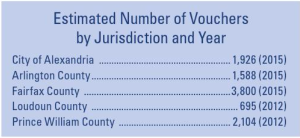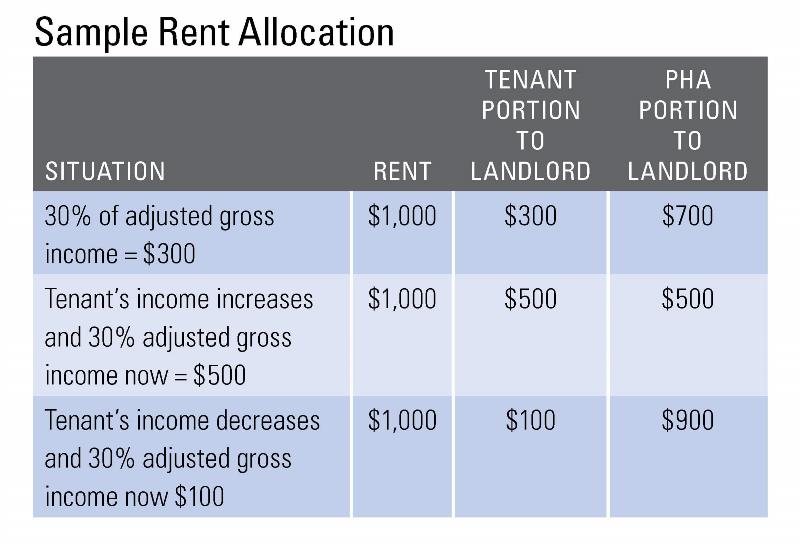Guide to Section 8 and Eligible Tenants
Landlords and Realtors® play a key role in the local effort to prevent and end homelessness. However, landlords are faced with the daunting process of tenant selection.
Northern Virginia has a robust Section 8 Housing Voucher program; therefore many prospective tenants interested in renting from landlords qualify under this program. The Section 8 program was created to ensure that working poor residents can reside in communities where there are more employment opportunities. They would also live in places where most residents work, rather than be concentrated in homeless shelters or low income apartment projects.
The federal government provides the resources to make it possible for low-income working poor, disabled and elderly residents to access affordable housing. Local governments and non-profit organizations partner with private landlords to administer the Section 8 program and to address problems that might arise.
There are myths about renting to tenants screened for participation in the program. This may have deterred landlords from signing on to the effort to fight homelessness by accepting tenants who qualify for Section 8. Armed with facts, landlords may find that the Section 8 Voucher Program is worth investigating.
"A common misconception is that a landlord must accept any tenant who receives Section 8 assistance."
SECTION 8 PROGRAM ADMINISTRATION
The Section 8 Program is a federally subsidized program to assist low-income, elderly, and disabled tenants find housing in the private market. The local public housing authority (PHA) administers the vouchers. In Northern Virginia, close to 9,500 Section 8 vouchers are administered by various programs. Of the two public housing authorities in Northern Virginia, only the Alexandria Redevelopment and Housing Authority administers vouchers. In Fairfax, the vouchers are administered by the Fairfax County Department of Housing and Community Development. In Arlington, the vouchers are administered by the Department of Human Services Housing Choice Voucher Program. In other jurisdictions, either housing or social service agencies administer the vouchers.
The PHAs receive funds from the U.S. Department of Housing and Urban Development (HUD). With the high cost of living in the Northern Virginia area, Section 8 vouchers can benefit both landlords and tenants. The Fairfax County Redevelopment and Housing Authority touts the advantages of leasing to Section 8 tenants:
• Landlords receive regular monthly payments from PHA which cover a significant portion of the rent
• Units are kept occupied and profitable
• Landlords screen and select tenants
• PHA will advise and assist with any problems concerning a tenant
• If income is reduced, the tenant’s portion of rent will be adjusted and the housing assistance portion will be increased
• Participants are screened by PHA for prior criminal activity
• Landlords may be able to receive a tax deduction for rental property (see IRS Publication #527)
• Property owners are providing one of the most important human necessities - stable housing

PROCESS FOR THE LANDLORD
A tenant who is issued a Section 8 voucher is responsible for finding suitable housing where the landlord agrees to rent under the Section 8 program. To join the program, the landlord must:
• Not be placed on the HUD’s debarment List
• Have provided a verified Employer Identification Number or verified Social Security Number
• Have provided a valid government-issued photo identification
• Be current on all payments or payment agreements related to utilities
• Have provided proof of ownership documents – copy of Deed of Trust or HUD 1 Settlement Statement.
Note that these requirements may vary by jurisdiction.
What is a Realtor’s® next step after receiving a listing agreement indicating that the landlord will accept applications from tenants who qualify for Section 8? Once there is an agreement with a potential tenant, the landlord will complete a Request for Tenancy Approval form. The form requests basic information, including, landlord name, unit address and monthly rent. The landlord must also negotiate a lease agreement with the potential Section 8 tenant. After the unit passes inspection, the landlord and the PHA will sign the Housing Assistance Payment Contract (HAP). Under its terms, the PHA agrees to make rent payments to the landlord on behalf of the tenant.
SCREENING PROCESS FOR SECTION 8 TENANTS IS THE SAME
A common misconception is that a landlord must accept any tenant who receives Section 8 assistance. Landlords may screen Section 8 tenants just as they would a non-Section 8 tenant. For example, a landlord may run a credit check, criminal background check, and verify prior address, rental and work history. The PHA will screen tenants for program suitability. To be eligible, the tenant has very low-income, is a U.S. citizen or a non-citizen with eligible immigration status, and is in good standing with federal housing programs.
Assistance is denied if the tenant:
• Has been evicted from federally assisted housing
• Has been terminated from another Section 8 program for cause
• Committed fraud, bribery, or any other corrupt criminal act in connection with a federal housing program
• Owes any rent to the PHA
• Failed to reimburse a PHA for unpaid rent or damages, or
• Has a family member with a repeated pattern of any type of criminal behavior.
RENT AMOUNT IS FULLY SUPPLEMENTED
Another misconception is that rental payments are inconsistent. As stated above, under the HAP contract, the PHA agrees to make rent payments on behalf of a Section 8 tenant. The tenant generally pays 30-35 percent of the tenant’s adjusted gross income. The remainder is paid by the PHA. If there is an increase or decrease in the tenant’s income, the PHA will recalculate the respective payments. The PHA makes the rent payment via direct deposit by the first of the month.

The rent amount is determined based on fair market rates, which are gross rent estimates. The PHA may establish the payment standard amount for a unit by bedroom size based on HUD’s published fair market rent (FMR) schedule for the FMR areas in which the PHA has jurisdiction. For example, the HUD 2015 FMR in Alexandria for a one bedroom is $1,230.
INSPECTIONS
HUD requires that units receiving Section 8 assistance meet HUD’s Housing Quality Standards (HQS). The requirements include a cooking stove, a kitchen with hot and cold running water, a working light fixture in the bathroom and kitchen, a fixed tub or shower with hot and cold running water, and no evidence of mold.
There are several types of PHA inspection:
• Initial Inspection: the unit must pass the HQS inspection before the start date of the HAP contract
• Annual Inspection: PHA will inspect the unit at least annually to make sure the unit continues to meet HQS
• Special Inspection: may be requested by the landlord, family, or a third party due to a problem between annual inspections.
The landlord may conduct periodic inspections to ensure the tenant is maintaining the premises in good condition.
WHAT IF PROBLEMS OCCUR?
"By participating in the program, ...a landlord is endured rent payments while providing needed housing to a low-income family, elderly or disabled tenant."
The landlord can resolve the problem with the tenant directly. If any notices are issued, the landlord should provide a copy to the PHA, which will conduct its own investigation. The tenant has an incentive to remedy any violation since a failure to remedy can result in the termination of the tenant from the Section 8 program.
The landlord-Section 8 tenant relationship is similar to a regular landlord-tenant relationship. By participating in the program, however, a landlord is ensured rent payments while providing needed housing to a low-income family, elderly or disabled tenant. The Section 8 program is a viable solution to address the pressing affordable housing needs in Northern Virginia.
Section 8 Resources
• Fairfax County Housing Choice Voucher Programs:
http://www.fairfaxcounty.gov/rha/rentalhousingprograms/hcv.htm
• Request for Tenancy Approval Form: http://portal.hud.gov/hudportal/documents/huddoc?id=52517.pdf
• HUD Fair Market Rent Schedule:
http://www.huduser.org/portal/datasets/fmr/fmr_il_history.html
• Sample Section 8 Inspection Checklist: http://portal.hud.gov/hudportal/documents/huddoc?id=52580.pdf